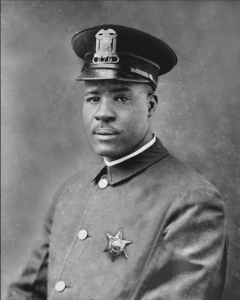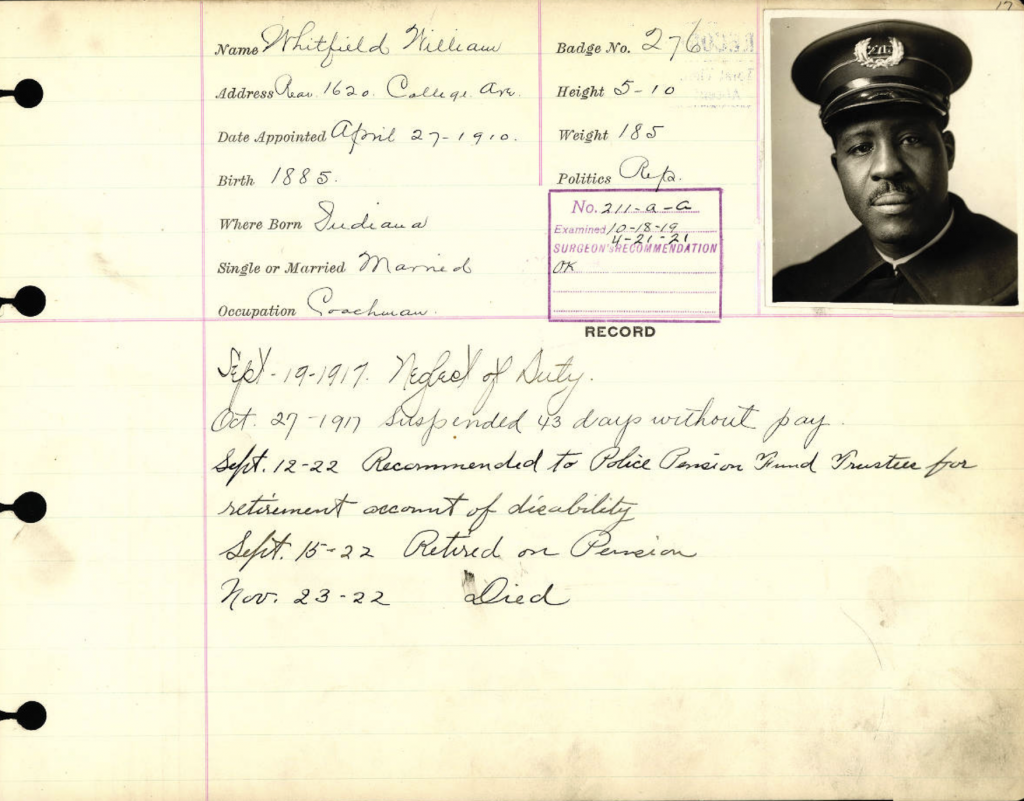
Photo info ...
Credit: Indianapolis Public LibraryView Source
(June 22, 1885-Nov. 24, 1922). William Whitfield was the first Black police officer in Indiana to die in the line of duty. The son of Bustow and Nellie Whitfield, he was born in Westfield, Indiana, north of Indianapolis in . He joined the on April 27, 1910. The department first assigned him to the predominantly Black corridor before transferring him to the white neighborhood, located on the north side at College and Fairfield avenues. He became one of the first civilian-clothed Black officers assigned to patrol the area. According to police records, white Watson Park residents did not welcome his presence.

On Sunday, June 18, 1922, at approximately 10:20 pm, Whitfield entered an alley west of 3500 N. College Avenue, where he encountered a suspicious-looking white man. Dressed in plain clothes, Whitfield identified himself as a policeman, asked the man why he was in the alley at that time of night, and reached for his badge to identify himself. The man in question turned and ran north into the alley. Whitfield gave chase. The man in pursuit turned, pulled out a pistol, and fired at Whitfield, who drew his weapon and fired two shots.
Whitfield took a bullet to the abdomen and collapsed on the sidewalk near 36th Street and College Avenue. A neighbor heard the gunfire and called the police. A motorist, Sherman Everling noticed a crowd gathering near Whitfield and offered to take him to the hospital before the police arrived at the scene. He bypassed and , instead taking Whitfield to , the only major Indianapolis hospital where white doctors treated Black patients.
City Hospital doctors determined that Whitfield’s injuries were fatal and refrained from providing any lifesaving procedures. African American doctor , however, soon arrived. He disagreed with the white doctors, believing that Whitfield could be saved with immediate surgical intervention. Because the segregated City Hospital prohibited African Americans from practicing there under any circumstances, Ward moved Whitfield to his hospital, Ward’s Sanitarium, located in the 700 block of Indiana Avenue, where he performed the surgery. Though Whitfield lived for almost six months, he succumbed to complications from the gunshot wound.
Whitfield was the first African American police officer killed in the line of duty in the state of Indiana. At the time of his death, Indianapolis city officials barely recognized Whitfield’s murder. The Indianapolis Police Department did not assign a detective to investigate the case, though it has done so for all other police murders that have taken place in the city. Some newspapers issued a brief death notice, but his murder received little other coverage in the press.
Black police officers, Black firefighters, O. H. Morgan Funeral Home, and other members of the Black community provided him a funeral service at . Whitfield lay in an unmarked grave at in “Section F,” near his paternal uncle of the same name until active and retired members of the Indianapolis Police Department purchased a grave marker and held a dedication for the marker’s installation on November 30, 1998—almost 76 years to the day of his burial on November 27, 1922.
Whitfield’s murder remains the first of three unsolved Indianapolis police murders, to date.

Help improve this entry
Contribute information, offer corrections, suggest images.
You can also recommend new entries related to this topic.